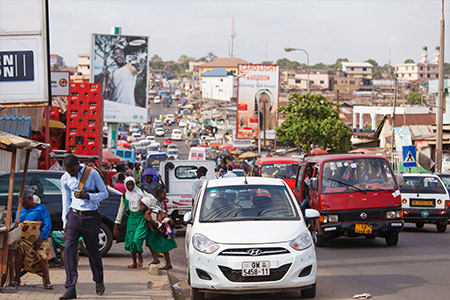Sustainable Transport in Rapidly Urbanising Cities: Accessibility Assessment in Ghana through a Gender Lens

African cities are urbanising rapidly, with limited planning or co-ordination to guide their development. When transport infrastructure fails to keep pace with growth, cities can become disconnected, increasing residents’ travel burden. While walking and informal public transport comprise the greatest proportion of all trips in Accra and Kumasi, car ownership has grown significantly over recent decades. This is partly due to the need to travel long distances to access opportunities. Men are much more likely to use cars for daily trips than women in urban areas in Ghana. This creates a gender gap in access. A continued shift towards private car travel could exacerbate gender inequality, an already severe congestion problem, and negatively impact the sustainability of the urban transport system. To avoid dependency on private travel, rapidly urbanising cities must invest in accessibility improvements for all residents.
The project uses the ITF’s accessibility framework - which has already been applied to over 100 cities worldwide - to evaluate existing gender differences in access to various opportunities in Accra and Kumasi and identify potential policy directions and infrastructure improvements. A scientific council of experts with local knowledge validated assumptions and data sources used as inputs to the modelling process, as well as model outputs and conclusions.
The model outputs include the number of opportunities that can be accessed using different transport modes (e.g. walking, cycling, private car, public transport) within certain travel time thresholds from each city area. The opportunities are differentiated by activity types, like healthcare, education, essential shopping and recreational facilities.
This is a collaborative project between the ITF and the OECD’s Sahel and West Africa Club (SWAC) with local expertise provided by a scientific council of academics from universities in the UK and Ghana.
Access the outputs below: